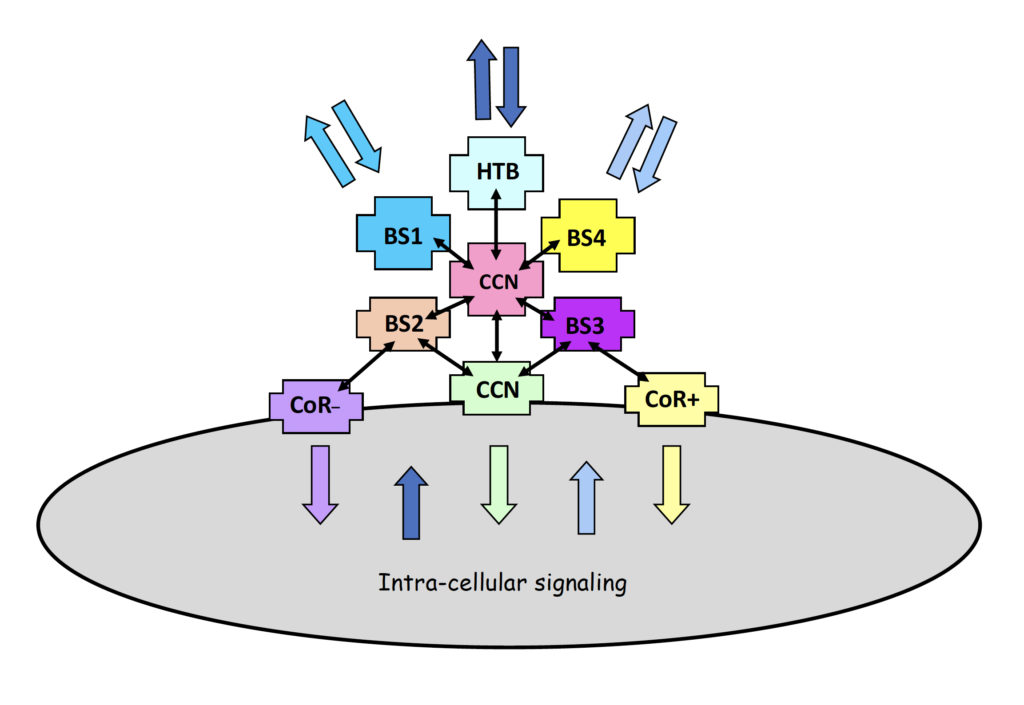Welcome
The International CCN Society (ICCNS) was created in 2001 after the First International Workshop on the CCN Family of Genes held in St Malo, 17-19 October, 2000.
The ICCNS welcomes you.
Six regulatory proteins involved in cell communication and signaling were originally designated by the CCN acronym [for Cystein-rich protein (Cyr61), Connective tissue growth factor (CTGF), and Nephroblastoma overexpressed (nov)]. They are involved in fundamental biological processes such as cell adhesion and migration, angiogenesis, development and signaling in normal and pathological conditions.

The official unified nomenclature adopted by the Hugo Nomenclature Committee (HGNC) and published in 2019 (Perbal B, Tweedie S, Bruford E.) calls for the use of the acronyms, CCN1-6, and discontinuation of misleading CYR61, CTGF, NOV and WISP 1-3 acronyms respectively. Therefore, and because we think that the 6 original CCN proteins are only a part of a multidisciplinary network of signaling proteins, the ICCNS has been renamed the International Cellular Communication network Society
It is important that both research teams who are newcomers and leaders in this field meet on a regular basis to discuss future prospects and unify their efforts so that the CCN field becomes highly interactive. The main goal of the International CCN Society is to foster the gathering of scientists interested in cell communication and signaling. Every other year since 2000, the ICCNS has organized biennial International Workshops on the CCN family of genes, open to PhD students, Postdoctoral and Principal Investigators . These workshops have been acclaimed by all attendees who appreciated this unsual family-type of meeting that provides opportunities to set up collaborations at all levels and constitute a unique occasion for the young researchers to meet leaders, with whom the can directly interact. It has recently been proposed that other families of regulatory factors involved in cell communication and signaling be considered as part of the broader CCN family of proteins [Perbal B et al. J. Cell. Commun. Signal. (2023) 17:229-232].
Goals
The main goals of the society are to:
- Provide comprehensive information related to the field of the CCN genes and proteins.
- Facilitate and organize the CCN workshops and other related meetings.
- Facilitate and promote the distribution of reagents among the CCN community.
- Promote contacts with others scientific societies.
- Provide a forum for discussion and interaction.
- Promote the dissemination of scientific information through the publication of the Journal of Cell Communication and Signaling.
Organisation
The International CCN Society is a non-profit association.
The Executive Board of the International CCN Society is in charge of the representation, and administration of the ICCNS. It is the interlocutor for JCCS and International meetings affairs.
It is comprised of:
- President – Bernard Perbal
- Treasurer – Annick Perbal
The President and Treasurer of the ICCNS are permanent members of the Council and Advisory Scientific Committee.
The Council of the International CCN Society is acting as an advisory committee to help the executive board in taking decisions regarding the scientific organization of the Society. It is in charge of promoting the scientific connections between the ICCNS and other scientific, medical and pharmaceutical societies worldwide, and participate to the widening of the ICCNS expertise.
The Council reports to the ICCNS Executive Board.
Members of the Council include
Havard ATTRAMADAL, Brahim CHAQOUR, Lester LAU, Ralf WEISKIRCHEN, and Satoshi KUBOTA
Csaba MATTA has been nominated President of the Advisory Scientific Committee (ASC), starting April 10th, 2025.
The Advisory Scientific Committee (ASC) of the International CCN Society is in charge of proposing and reviewing the operations of the ICCNS from a scientific angle.
The President of the ASC will proceed after consultation with the Executive Board to the nomination of ASC members
Membership 2024-2025
See dedicated page (https://ccnsociety.com/membership)
ICCNS-SPRINGER AWARD RECIPIENTS :
Professor Paul Bornstein (2008-2013), Professor Edward Calabrese, Professor Robert Baxter, Professor Carlo Croce, Professor Judith Campisi (1948 – 2024) , Professor Meenhard Herlyn, Professor Cynthia Kenyon, Professor Lester Lau, Professor Katia Scotlandi